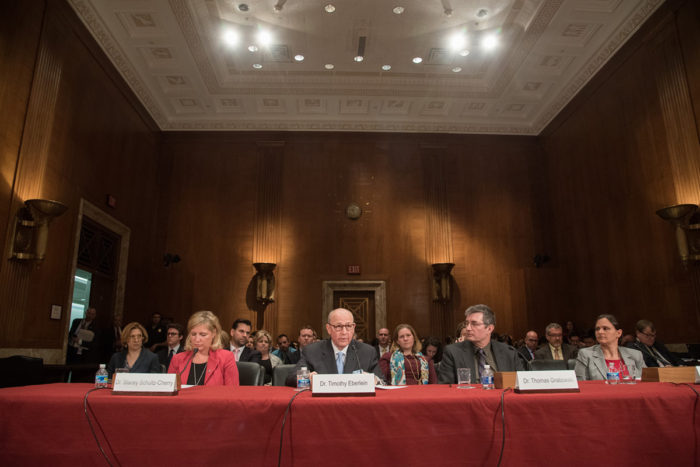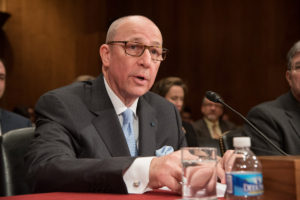Eberlein testifies in support of medical research funding
Federal grants have yielded treatments, Siteman Cancer Center director tells Senate subcommittee
 Courtesy of the Senate Appropriations Committee
Courtesy of the Senate Appropriations CommitteeTimothy J. Eberlein, MD (second from left), of Washington University School of Medicine in St. Louis, testifies in support of funding for the National Institutes of Health (NIH) on March 8 before the U.S. Senate Subcommittee on Labor, Health and Human Services, Education, and Related Agencies.
Federal funding is critical to the search for innovative therapies for cancer and other diseases, Timothy J. Eberlein, MD, told members of a U.S. Senate subcommittee March 8 in Washington.
Support from the National Institutes of Health (NIH) also is vitally important to the careers of young scientists whose ideas and work help improve patient outcomes, said Eberlein, the Spencer T. and Ann W. Olin Distinguished Professor and head of the Department of Surgery at Washington University School of Medicine in St. Louis.
 COURTESY OF THE SENATE APPROPRIATIONS COMMITTEE
COURTESY OF THE SENATE APPROPRIATIONS COMMITTEE“These investments have allowed us both to understand the fundamental biology behind disease and then to develop the strategies needed to develop therapies and cures,” he said before the Subcommittee on Labor, Health and Human Services, Education, and Related Agencies. The subcommittee makes recommendations on NIH funding to other senators.
Eberlein — who also is the director of Siteman Cancer Center at Barnes Jewish-Hospital and Washington University School of Medicine and surgeon-in-chief at Barnes-Jewish Hospital — testified at the invitation of Sen. Roy Blunt, R-Mo., the subcommittee chairman.
Last year, Blunt and others successfully advocated for a $2 billion, or 6 percent, boost in NIH funding for the current fiscal year over the previous one. The $33 billion NIH ultimately received included $5.9 billion for the National Cancer Institute (NCI).
“In the next few years as we continue to confront difficult spending choices, we really have to continue, in my view, to firmly establish our federal commitment to the National Institutes of Health,” Blunt said during last week’s hearing. “Since its founding, the NIH has funded research to raise life expectancy, to lower health-care costs and to improve the quality of life for all Americans.”
During his testimony, Eberlein said past federal support for the Human Genome Project, for example, had yielded therapeutic advances available today. Completed in 2003, the international effort involved Washington University researchers who decoded 25 percent of the 3 billion DNA base pairs that make up the human genome. That work led, in turn, to the sequencing of cancer genomes, pioneering research that helps physicians understand the genetic cause of a patient’s cancer.
“Today, we are performing clinical trials that use state-of-the art genomic analysis to determine precision treatments in patients with leukemia, breast, lung and other tumors,” Eberlein said.
Federal funding, he said, spurred advances in genomic research that helped Washington University researchers find an effective off-label therapy for colleague Lukas Wartman, MD, now an assistant professor of medicine and a leukemia doctor. Wartman was diagnosed with leukemia while a fellow at the School of Medicine.
“Through this precision therapy, Dr. Wartman’s disease went into remission, further enabling him to undergo a stem cell transplant,” Eberlein said. “He now is working to care for cancer patients, and under his leadership, we have established a multidisciplinary genomics tumor board that meets regularly to identify patients who might benefit from genome sequencing.”
Further research has led Washington University scientists to work on vaccines against melanoma and breast, brain, head and neck, and lung cancers “tailored to eradicate the patient’s specific tumor with minimal side effects,” Eberlein said. These vaccines now are in clinical trial.
“As we continue to develop our genomic understanding of cancer, I am confident we can get to a point where affordable, personalized cancer treatments will be widely available,” Eberlein said. “The reduction in mortality, especially for children, is a direct result of improvements in treatment — treatments largely discovered through investigations made possible through grants from the NIH.”
Other medical experts who testified at the subcommittee hearing were: Stacey Schultz-Cherry, PhD, of St. Jude Children’s Research Hospital; Thomas Grabowski, MD, of the University of Washington; and Jennifer Sasser, PhD, of the University of Mississippi.







